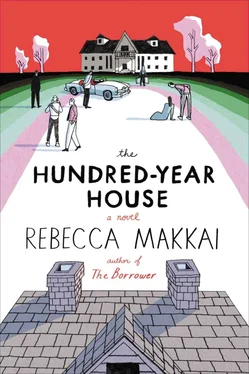On December 31 Zee and Doug walked to the big house, arms full of belated gifts. They’d spent Christmas itself at Doug’s mother’s house in Pennsylvania, and there, amid the hoarded statuettes and smoke-stained walls, Zee had felt almost normal again. They ate casserole for four days straight, and helped put in storm windows. It didn’t feel like a return to stability or even a vacation, though, so much as a stay of execution. They had to come back to Laurelfield to face their lives and their marriage and the end of the millennium. Any number of explosive things.
Gracie had decreed that the millennium would go out with a late Noel, and that all presents must be wrapped in silver and blue to make Miriam more comfortable. (“I don’t get it,” Doug had said, and Zee had said, “Just because she’s Jewish. My mother’s an idiot.” “Miriam’s Jewish?” And when she’d stared at him in disbelief, he’d added, “I guess I just thought of her as Texan.” “What, they don’t have Jews in Texas?” “No, like ‘Don’t Mess with Texas.’ Like that sort of overrides everything. I don’t know.” And she’d looked at him hard, trying to figure out if he was really this clueless, or if he thought he needed to pretend, this late in the game, that he hardly knew Miriam. She wanted to tell him he needn’t bother.)
They gathered in the living room around the tree, Case and Miriam underdressed in jeans. Case still wore his boot, but at least his face had resumed its normal shape. The golden tan he’d shown up with that summer was long gone, replaced by a sickly gray. Sofia was off, the food she prepared yesterday already reheating in the oven.
There were flashlights and oil lamps lined up on the sideboard, waiting for midnight, and boxes in the kitchen full of food and aspirin and matches and batteries and vitamin C and toilet paper, alongside office-sized bottles of water and a kerosene stove. Bruce kept checking his watch. It was only six thirty, but every hour he turned on the TV to check the march of time and potential disaster. City after city survived. Electricity had stayed on in Beijing and New Delhi and Moscow and Paris. Bruce was convinced now that the real trouble wouldn’t start until midnight hit the U.S. east coast, and so that’s what they were waiting for: eleven o’clock central, when the Times Square ball would fall and so, presumably, would humanity.
Miriam scooted around the floor like a lithe elf to distribute the packages. For Bruce, a book on subsistence farming. For Gracie, an antique toast rack. When Miriam opened her present from Doug, Zee nearly gagged: a Ziploc bag of sea glass, blue and green and copper. It would have taken him weeks on the frigid beach to collect so much. Miriam said, “I know how I can work them in!” She meant the monstrous thing on the board in the kitchen, the vertiginous patterns she was laying down inch by inch in wet mortar, better than her other work only in that the pieces were tile and glass instead of garbage. Case gave everyone chocolate. Miriam began opening Zee’s gift, which was truly awful. Three days ago, Zee had gone back to her office and grabbed the pistol cylinder. It was an antique, of sorts. It was interesting. It was also a nongift. It was, quite literally, an empty threat of violence.
But Miriam didn’t seem alarmed. “This is amazing!” she said.
“I thought you could stick pencils in it.”
“It has to be ancient. I love it.”
Zee was chagrined that no one had to ask what it was. Even her mother, after a moment of silence, said, “Zilla, where on earth did you find such a thing?”
And Zee said, “Boston.”
There were survival kits from Bruce, sweaters from Gracie, a collection of Marianne Moore poems from Miriam to Doug, with a bizarre inscription: for walks under those titanic pines . Doug turned pink. He smiled at his shoes.
And then — as if Zee had done it herself, as if her rage had flown across the room — the window behind the tree shattered into a million raining shards. They kept falling, with a sound like a xylophone, until nothing was left, just a rectangle of night and frigid wind. Gracie stopped shrieking and they all took shelter on the far side of the room. Miriam’s arm was cut, and Doug’s eyebrow, but not badly. Bruce checked his watch (only seven fifteen, not nearly time for the apocalypse), grabbed a poker, and headed out to make sure it wasn’t a thrown rock — but they knew it wasn’t, the way the glass had just disintegrated so gracefully, from everywhere at once. Gracie scampered to silence the burglar alarm.
—
They all moved gingerly for the rest of the night, in case another window shattered. After dinner, Zee cleared the table and snuck back to the living room. Bruce had duct taped a blanket over the window, but the frozen air still crept through. She poured straight vodka into her teacup, and let the tea bag diffuse and turn the liquid golden. She didn’t care how it tasted. Bruce retreated to his study to watch the New Year hit whatever Atlantic islands were three hours ahead. Gracie stood in the kitchen, sorting absently through yesterday’s mail, throwing away a late Christmas card from distant family in Toronto. “I don’t know why they persist in sending these,” she said. Back in the dining room, Miriam hovered over Doug’s chair, inspecting his eyebrow. Her small breasts were inches from his mouth. “I’m worried there’s a sliver still,” she said.
Zee pretended to read Bruce’s Tribune and then circled back to the dark living room again, her teacup empty. She’d already started to pour when she noticed Case standing silent with his crutches by the blown-out window. If she hadn’t been numbed from the alcohol, she’d have screamed.
“Would you like a drink?” she said.
Case’s face was ravaged, sunken, nothing but eye sockets and cheekbones. It was hard to remember the way he used to smirk at everything.
She tried again. “Case, I’m sorry about all of it. You’ve had terrible luck. No one deserves that.”
“You know what’s funny?”
She shook her head.
“As soon as someone says luck , you know we’re not really talking about luck anymore. If it were luck, the coin would come up heads half the time. Right? It would balance.”
“But it never does.”
“I just think luck ’s the wrong word. When we bother talking about it, we mean there’s been a whole string of good things or a string of bad things. Like the coin keeps coming up tails.”
“So maybe what we mean is fate.”
“You know about her, don’t you? You know about her.”
“Oh. Oh, Case.” It was terrible: She honestly hadn’t given him much thought in all this. He had it worse than her, home all day to see it, no job. “I do know. Case, I’m sorry. I — everyone’s going to get through this.” She brought him a glass of vodka, which he took and held like he didn’t know what it was for.
Case said, “She put her finger on my lips.” He reached out one finger and actually pressed it right to Zee’s mouth before she could move, before she could even register his words. His eyes were wild and green, fixed on hers. Zee took his hand as gently as she could and removed it from her face. “And you’ve seen her too, I know you have. She comes to you too.”
Zee regretted the alcohol fog that wasn’t quite allowing her to shift paradigms. He couldn’t be talking about Miriam, could he? He looked like he might cry, actually cry. “Are you talking about Violet?”
He shrugged, humiliated, and didn’t answer.
“Case, I think you need to see a doctor. This house can get to people, but no, I haven’t seen — not literally . Not like that.”
Читать дальше












